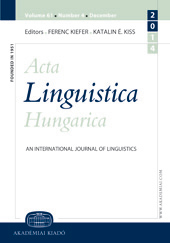“Compound verbs” in Komi: grammaticalisation without a grammatical morpheme?
“Compound verbs” in Komi: grammaticalisation without a grammatical morpheme?
Author(s): László FejesSubject(s): Morphology
Published by: Akadémiai Kiadó
Keywords: Komi-Zyryan; grammaticalisation; compounding; bound morpheme; constructional grammar;
Summary/Abstract: This paper explores Komi-Zyryan compound verbs. A small class of verbs can be formally recognised in posterior constituents of compound verbs, and compounds involving each of these verbs exhibit semantic and grammatical properties characteristic of their posterior constituents. On the other hand, the individual compound verbs are semantically non-compositional. The posterior constituents cannot be taken to be form-meaning complexes, i.e., morphemes. Therefore, some other, non-morpheme-based linguistic analysis is needed. This is a peculiar case of grammaticalisation where the result is not a grammatical morpheme.
Journal: Acta Linguistica Hungarica (Since 2017 Acta Linguistica Academica)
- Issue Year: 51/2004
- Issue No: 1-2
- Page Range: 5-43
- Page Count: 39
- Language: English

